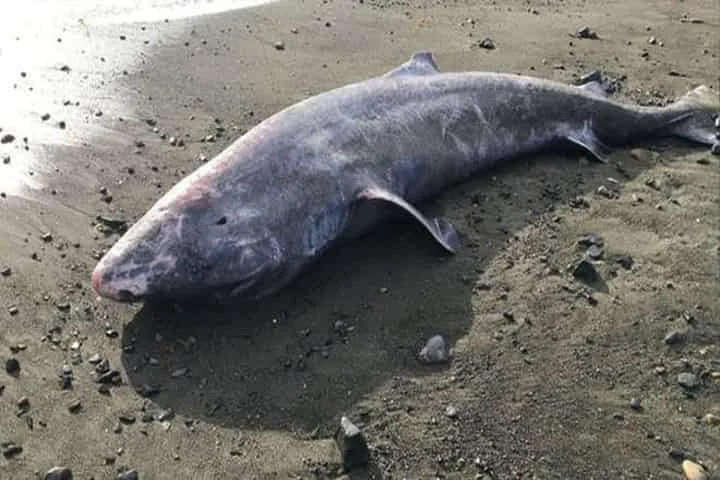When last month, a Greenland shark or Somniosus microcephalus was found on the beach of England’s Cornwall, it made headlines. The reason: this species is rare and elusive and not much is known about it.
Now, after having examined it thoroughly, a report in smithsonianmag.com stated that experts have confirmed that the fish died from a brain infection called meningitis. This as per an article in USA Today, is the first recorded case of disease-related death in this rare species.
Among the physical features these sharks have, are rounded snouts and small fins. Found in the deep and cold waters of the North Atlantic and Arctic Oceans, they are generally found at 2,200 metres or 7,200 feet below the surface.
Since very little information and details are known about this species which has had scarce interaction with human beings, details about this stranded shark will help us understand them better.
On March 13, this 13-foot-long female shark had been discovered trapped. Estimated to be 100 years old, she is categorised as juvenile as this species can live up to 400 years or more. Physical examination revealed that its fin was damaged and that there was a slit on its stomach pointing to it being stuck in the beach and passing away after flailing about and taking in sand.
The body of the fish was swept away in the sea by the tide and it was recovered on March 15 by a recreational boating company. Pathologists at the Cornwall Marine Pathology Team performed necropsy on the creature.
Explaining the examination, James Barnett, a pathologist of the Cornwall Marine Pathology Team in a statement said: "During the post-mortem examination, the brain did look slightly discoloured and congested, and the fluid around the brain was cloudy, raising the possibility of infection.”
Plans are afoot to publish details of the post-mortem investigation in a scientific paper.
The investigation of the brain revealed to the pathologists a bacteria known as Pasteurella in the fluid that had collected. Pasteurella bacteria, which is rod-shaped is the cause of many severe diseases in domesticated animals and causes some mild infections in people and it is the one that may have led to meningitis in the shark. A report in the Telegraph stated that infection in the brain may have confused the shark and probably made it come to the shallow waters from its habitual depths.
Commenting on this shark, Rob Deaville, the Zoological Society of London's project lead for the Cetacean Stranding Investigation Programme (CSIP), in a statement mentioned: “Discovering that this shark had meningitis is likely a world's first, but the significance of this in terms of any wider stressors is unknown. Ultimately, like most marine life, deep-sea species such as Greenland sharks may also be impacted by human pressures on the ocean, but there is not enough evidence at this stage to make any connections.”
CSIP was established in 1990 and it investigates those cetaceans, marine turtles, sharks, and whales who are found stranded around the UK's coastline. Till now CSIP have studied more than 12,000 stranded cetaceans and 3,500 necropsies have been conducted. The data collected provides extensive details about mortality and stranding in these species.
Also read: Study confirms that sharks sleep, even when their eyes are open!




















